Matt Rees's Blog - Posts Tagged "graham-greene"
Writer is pro-Palestinian and pro-Israeli
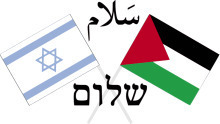 The best thing about moving from journalism to fiction writing is that people show you more respect.
The best thing about moving from journalism to fiction writing is that people show you more respect.As a journalist covering a troubling issue like the Israel-Palestinian conflict, I was often subject to rather nasty verbal attacks during public speaking engagements. For a partisan of either side, I seemed a fine target for their generalized contempt—they thought journalists were all against them and here was a live reporter on whom they could vent their spleen.
Thankfully that doesn’t happen now that I’m the author of a series of Palestinian crime novels. I wasn’t sure that it would be different, but it turns out that there’s a big change in the way people behave toward me.
Here are two examples from the last week alone.
In Cologne, Germany, last week, I talked in a bookstore at the invitation of the Cologne-Bethlehem Association. Much of the audience was made up of middle-aged and older Germans who visit Bethlehem frequently and have made strong ties with the people there.
One older gentleman suggested that, because my first novel THE COLLABORATOR OF BETHLEHEM shows the corruption and extortion carried out by the gunmen of the town during the intifada, my book “tended toward Israeli propaganda.”
But the old fellow was very respectful and as I answered him I could tell he was listening. (My response, of course, is along the lines of “No, actually the book doesn’t even address whether or not it’s right to shoot at Israelis; the book concerns itself with the negative effect those gunmen had WITHIN Palestinian society.”) Listening’s something that was often evidently not happening when, as a journalist, I would talk to audiences.
Then this week I went to the Israeli settlement of Efrat in the West Bank. I’ve visited many times before to write news reports about the confiscation of land or the endless pressure from Washington to stop building in the settlements. This time I was invited by the Gush Etzion Book Group, a few dozen women who live in the local settlements.
There had been quite some fiery debate within the group about whether to have me come and speak to them. Indeed, someone hinted that certain members of the group had stayed away.
Nonetheless, I was glad to be there. After all, much of THE COLLABORATOR OF BETHLEHEM takes place in the village of Artas and the Dehaisha Refugee Camp, which abut the northern reaches of Efrat. I want very much to talk about my books with people who have a stake in the Israeli-Palestinian struggle. Provided they’re willing to listen respectfully, to examine what I’m actually saying and not what they think I’m saying (or what they wish I’d say.)
The evening in Efrat went well and, in fact, much of what we talked about was how little I’m interested in politics—despite the apparently political subject-matter of my novels. What interests me is “the life that remains when politics is sluiced away like the filth a stray dog leaves in the street” (that’s a line from my sleuth Omar Yussef in THE FOURTH ASSASSIN, the next of my novels, which will be published Feb. 1).
Such respectful treatment is a big contrast to situations I encountered as a journalist. Then I would look out over audiences which seemed to be entirely red-faced and with arms crossed over every chest. The hostlie body language didn’t change, even though I was essentially saying the same things I’m saying now. Partisans hate journalists and, I believe, many of them used somehow to detest that I had found a kind of personal peace in covering the very conflict that stirs them up and stresses them so.
In Cologne and Efrat, people heard what I had to say and understood that I’m pro-Palestinian and pro-Israeli. I'd like all the people I know here to have a good life, not the violent situation they suffer. Politics makes people choose sides, and I want no part of that.
I also think choosing sides makes for rather bad novels. It’s in the shades of gray, where decisions are so difficult or even impossible to make, that a novel becomes truly compelling--think of Graham Greene’s best novels. Political journalism on the other hand is, to say the least, dreary. Think of the glib rubbish turned out by columnists who have to fill three op-ed spaces each week.
Who would you respect more—Graham Greene or G. Gordon Liddy? See what I mean?
So I’ll continue to talk about my books to anyone who’ll take the time to read them, because that in itself is a sign of respect and openness. Those, after all, are the qualities most needed by both sides of the Israeli-Palestinian conflict if they’re ever to find peace.
(I posted this first on a joint blog I write with some other international crime writers.)
Published on January 14, 2010 23:21
•
Tags:
bethlehem, book-groups, cologne, crime-fiction, efrat, fiction, g-gordon-liddy, graham-greene, gush-etzion, international-crime-authors-blog, israel, israelis, journalism, koeln, matt-beynon-rees, mystery-novels, omar-yussef, palestine, palestinians, politics, settlements, settlers, the-collaborator-of-bethlehem, the-fourth-assassin, west-bank
Why's a Palestinian sleuth in Brooklyn?
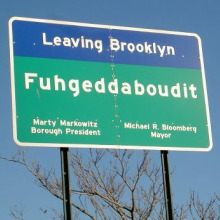 I’ve been called the Dashiell Hammett of Palestine, the John Le Carre of the Middle East, the James Ellroy of…Palestine, the Graham Greene of Jerusalem, and the Georges Simenon of the Palestinian refugee camps. Depends which review you happen to have read.
I’ve been called the Dashiell Hammett of Palestine, the John Le Carre of the Middle East, the James Ellroy of…Palestine, the Graham Greene of Jerusalem, and the Georges Simenon of the Palestinian refugee camps. Depends which review you happen to have read.Until now I’ve published three novels about Omar Yussef, my Palestinian schoolteacher/sleuth. Omar has been described as the Philip Marlowe of the Arab street, the Hercules Poirot of the Near East, Sam Spade fed on hummus, and Miss Marple crossed with Yasser Arafat.
Why then is my new Omar Yussef novel THE FOURTH ASSASSIN,/a> set in New York City? Not in the Middle East, the Near East, Palestine, the Levant, the Fertile Crescent, or any other place where Yasser may be fornicating with dear old Miss Jane Marple.
I lived in New York six years, until I came to Jerusalem in 1996. I know it better than any city outside the Middle East. I had a lot of fun in New York. Maybe too much fun. In no other place in the world can a young man so overindulge in the temptations originally offered in the city of Sodom. Which in reality is close to where I live now in Jerusalem. Though you wouldn’t know it to look at the place.
I know New York with my eyes closed. Literally. In my twenties, after leaving some bar or club, I blacked out on every line on the subway map.
I dated women from every borough of the city, from Westchester and upstate. From the 201 area code (dare I say, New Jersey.)
I married a girl from the North Shore of Long Island, and in my continuing effort to know New York in all its facets, when we divorced, I married a beautiful woman from the South Shore of Long Island.
But each time I returned, no matter how well I thought I knew the place, New York seemed different. The change became most apparent after 9/11. I wanted to understand it through the eyes of Omar Yussef.
That’s why he finds himself in Brooklyn in THE FOURTH ASSASSIN. Visiting the area of Bay Ridge that has become known as “Little Palestine,” for the influx of Palestinian immigrants.
Little Palestine isn’t a community of Palestinian intellectual émigrés, such as sprang up in European capitals in the 1970s. It’s a new wave of young men mostly, saving to bring their families over, working two or more jobs. Theirs is a typical American immigrant story.
Except for the FBI agents going through their trash.
The Bureau didn’t uncover any broad conspiracy in Little Palestine. But it did add to the tensions between the Arab community and other New Yorkers after the attack on the Twin Towers.
That’s the situation into which I wanted to place Omar Yussef. Mutual distrust, after all, makes for good crime fiction.
In Brooklyn, it also happens to be real.
Published on February 11, 2010 23:51
•
Tags:
bay-ridge, brooklyn, crime-fiction, dashiell-hammett, fbi, fertile-crescent, georges-simenon, graham-greene, hercules-poirot, james-ellroy, jerusalem, levant, little-palestine, long-island, middle-east, miss-jane-marple, miss-marple, near-east, new-jersey, new-york, omar-yussef, palestine, palestinians, philip-marlowe, sam-spade, the-fourth-assassin, upstate-new-york, westchester-county, yasser-arafat
The UK Crime Fiction Insider: Duncan Campbell's Writing Life
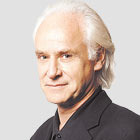 One of the great pleasures of life as a writer is being paired with interesting authors when you speak at book fairs. (It's also an occasional rough ride when you find yourself stuck with a bum who can't write, but I'm being nice here so I won't go into any of those.) The most delightful fellow I've ever met in this way is Duncan Campbell with whom I was paired at the book fair in his native Edinburgh two years ago. He also happens to be the British crime writer with the best knowledge of the UK's criminal fraternity -- which he covered for three decades for The Guardian, famously managing to be liked by all the old lags he wrote about. His latest novel, "If It Bleeds," focuses on the nexus of crime and crime journalism. It's hilarious and rather chilling -- particularly so for an ex-journalist such as myself whose nightmares are much more likely to take place in a newsroom than in criminal haunts. Duncan's previous novel "The Paradise Trail" drew on his experience of the "hippie trail" in India in the early 1970s. Like "If It Bleeds," it drew on his own experiences, but had much more than mere authenticity -- drugs, dirt, noise and hippie naivete -- to recommend it. In a review, my esteemed fellow Welshman (and former hashish kingpin) Howard Marks wrote: "The dialogue...is the wittiest I have read in any work of fiction, including Catch-22, my hitherto favourite. The fascinating historical and cultural context is unobtrusively drip-fed, and the whodunit suspense masterfully created." He also said the drug stuff was on the money. Here's Duncan on writing and on the life he lives around it:
One of the great pleasures of life as a writer is being paired with interesting authors when you speak at book fairs. (It's also an occasional rough ride when you find yourself stuck with a bum who can't write, but I'm being nice here so I won't go into any of those.) The most delightful fellow I've ever met in this way is Duncan Campbell with whom I was paired at the book fair in his native Edinburgh two years ago. He also happens to be the British crime writer with the best knowledge of the UK's criminal fraternity -- which he covered for three decades for The Guardian, famously managing to be liked by all the old lags he wrote about. His latest novel, "If It Bleeds," focuses on the nexus of crime and crime journalism. It's hilarious and rather chilling -- particularly so for an ex-journalist such as myself whose nightmares are much more likely to take place in a newsroom than in criminal haunts. Duncan's previous novel "The Paradise Trail" drew on his experience of the "hippie trail" in India in the early 1970s. Like "If It Bleeds," it drew on his own experiences, but had much more than mere authenticity -- drugs, dirt, noise and hippie naivete -- to recommend it. In a review, my esteemed fellow Welshman (and former hashish kingpin) Howard Marks wrote: "The dialogue...is the wittiest I have read in any work of fiction, including Catch-22, my hitherto favourite. The fascinating historical and cultural context is unobtrusively drip-fed, and the whodunit suspense masterfully created." He also said the drug stuff was on the money. Here's Duncan on writing and on the life he lives around it:How long did it take you to get published?
I was lucky. I had written an article about Billy Connolly, the terrific Scottish comedian, in Time Out magazine. It was 1975 and he was just about to become very big so Pan, the publishers, wanted a speedy book about him. They asked me if I would like to go on tour with him and write it, with his cooperation. You kidding?
Would you recommend any books on writing?
George Orwell’s essay, Politics and the English Language. The Guardian (where I worked for 22 years, ) Style Book is very helpful.
What’s a typical writing day?
When I was a carefree, young freelance journalist, I would write until the early hours of the morning, with music playing in the background. Now I do all my ‘best work’ ho, ho, in the morning. When I wrote my two novels, I worked a five-day week and aimed for 2000 words a day. I thought this was impressive but an old pal, Jim McClure, who very sadly died a couple of years ago, told me that when he wrote his great prize-winning South African crime novels, he would work from 9 am till 5 am every day for two weeks and have a book at the end of it. He was South African but, obviously, with Scottish Calvinist roots.
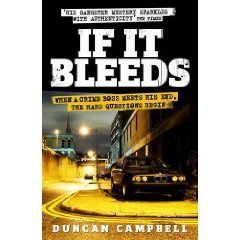
Plug your latest book. What’s it about? Why’s it so great?
It’s called If It Bleeds, (Headline) which is taken from the old newsroom motto - ‘if it bleeds, it leads’, i.e., if it’s about murder and gore, it goes on the front page or at the top of a news bulletin. It’s about a 50-something crime reporter called Laurie Lane who is asked by an old London gangster, Old Man Hook, to ghost his autobiography. Soon after that, the gangster is shot dead. Laurie has his own problems as his country singer wife has left him for an older man, his teenage daughter is meant to be doing her A levels and he is being investigated by his digitally-snooty news editor for fiddling his expenses. (I promise you, it’s not autobiographical.) Can Laurie find out who killed the gangster and save his job? Could it be the Russian hoods who want a slice of the Hooks’ clubland business? The gangster’s own family? Bent coppers? What’s the Thailand connection? So it’s about crime and crime reporting and bad jokes told by a veteran crime reporter called ‘the Vicar’. Now read on...
How much of what you do is:
a) formula dictated by the genre within which you write?
b) formula you developed yourself and stuck with?
c) as close to complete originality as it’s possible to get each time.
I think most of us are slaves - or at least indentured labour - to the genres in which we work. My earliest ‘grown up’ reading was Agatha Christie and I read as many of her as I could. I went on to lots of Graham Greene and Evelyn Waugh. Their ghosts must hover somewhere.
What’s your favorite sentence in all literature, and why?
Anything by Groucho Marx on a good day.
What’s the best descriptive image in all literature?
John Kennedy Toole creates some spectacular images in A Confederacy of Dunces.
Who’s the greatest stylist currently writing?
Someone just gave me an old copy of James Cameron’s Point of Departure, which I had not read for a while. He writes with lucidity, grace, humour. Quite a feat. Scottish, of course. I know he’s dead but his copy is as alive as ever.
Who’s the greatest plotter currently writing?
Gosh. Tempted to say Alistair Campbell (no relation.) John le Carre?
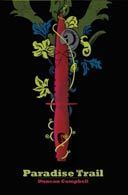
How much research is involved in each of your books?
I’ve written three non-fiction books on crime: That Was Business, This Is Personal; The Underworld; and A Stranger and Afraid. They all required quite a lot of research which I - mostly - enjoyed. The two novels, The Paradise Trail and If It Bleeds, were both the result of decades and decades of diligent research which I imagined, at the time, was life.
Where’d you get the idea for your main character?
Pathetically, the main characters in both novels have a lot of me in them.
Do you have a pain from childhood that compels you to write? If not, what does?
I think if I had had a more painful childhood, I might have been a better writer. But who do you complain to?
What’s the best idea for marketing a book you can do yourself?
If you are a journalist working for a publication, you can always try and persuade the features department to run a piece to coincide with a book’s publication. Fortunately, the places I have worked have had the sweetest, most decent and, I would say, the most perceptive of people working in those departments.
What’s your experience with being translated?
If I could speak a word of Swedish or Norwegian, I would let you know.
Do you live entirely off your writing? How many books did you write before could make a living at it?
I have always lived off my ‘writing’ but that has mainly been journalism. I don’t know many people who make a living solely from books.
How many books did you write before your first one was published?
I wrote a book called The Walking Wounded in 1972, which was based in Calcutta and which was sensibly rejected by a publisher in San Francisco at the time. I hung on to the manuscript for 32 years and used it as source material for The Paradise Trail. Waste not, want not.
What’s the strangest thing that happened to you on a book tour?
I can’t say at the moment because I want to make use of it, in a slightly shameful way, in a book which I have yet to write.
What’s your weirdest idea for a book you’ll never get to publish?
I’d like to do a graphic novel about crime but am hampered by the fact that I can’t draw.
Published on February 23, 2010 10:07
•
Tags:
billy-connolly, british-crime-fiction, catch-22, crime-fiction, duncan-campbell, edinburgh, edinburgh-book-fair, evelyn-waugh, george-orwell, graham-greene, groucho-marx, hippie-trail, hippies, howard-marks, if-it-bleeds, india, scotland, the-guardian, the-paradise-trail, time-out
Stealing the novel
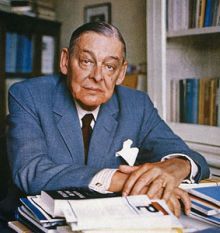 If there’s one thing that authoring a series of novels will teach you, it’s that you can’t wait for inspiration. But you can prompt it, give it little electric shocks that’ll keep it bubbling within you. Here are a few methods I use to do that.
If there’s one thing that authoring a series of novels will teach you, it’s that you can’t wait for inspiration. But you can prompt it, give it little electric shocks that’ll keep it bubbling within you. Here are a few methods I use to do that.I go to the places I’m writing about. I talk to people who might be similar to (or even the basis for) my characters. I read about them and their world. I engage in the same activities in which they specialize. But I also read about entirely different subjects – so long as they’re extremely well-written.
Some of these ideas sound self-evident. I’ve written a series of Palestinian crime novels, so it stands to reason that I’ve spent the last decade and a half in Gaza, Bethlehem, Nablus, Jerusalem, tasting and smelling and talking and looking. I even force myself to read the drivel that gets written about this place in journalism and nonfiction—occasionally I come across something good, but mainly it just gets me down. How many times can you listen to a mediocre pop song? Well, that’s how most Middle East journalism sounds in my ear.
For a novel I have coming out next year about Mozart, I learned to play the piano. I learned that I wasn’t much good at it, but I also saw inside the music in a way I couldn’t have done merely by listening.
Not so obvious, however, might be the wide reading. A number of writers I’ve met or read about say they don’t have time to read anything that isn’t directly related to their research. In other words, if I’m writing about Berlin, it’s goodbye to Raymond Chandler for the next 12 months.
Well, T.S. Eliot wrote that “Immature poets imitate; mature poets steal.” I can look back at my literary efforts as an undergraduate and see what imitation there was throughout all of it. Now I’m mature (I try to fight it; I work out; but I concede, I’m maturing…) and I’ve figured out how to steal.
What Eliot meant was that it takes a while, as a writer, to realize how to make things your own. That means going beyond the plagiaristic imitation of youth, which is humble and filled with homage, to the confident sense that whatever you see another writer do, you can do it better. Then when you read something good, it doesn’t appear in your work as the same thing—it spurs you to develop your own spin on the thought that’s provoked in you by what you’ve read.
Let me give you an example. I challenge any one of you to show me a contemporary writer who can build a character in a fuller, more convincing manner than Hilary Mantel, who won the Booker Prize last year for her masterful “Wolf Hall.” If anything, her 1992 classic “A place of Greater Safety,” a novel about the French Revolution, is even more amazing than her now-famous prize-winner.
“Greater Safety” tells the story of the entire revolution through the characters of Robespierre, Danton and Desmoulins. From their childhoods to (it’s a historical novel so I don’t have to give any spoiler alerts) their executions. Each of them is built slowly, and we see their character arc in a way that even they don’t—watch their idealism tainted with violence, until it turns on them. Because we take that journey with them, we care more deeply for them, even as they become murderous and unjust.
The “stealing” comes in whenever I see a point that Mantel uses to build that empathy. Robespierre, we learn, always carries a tiny copy of Rousseau in his pocket. Some time later it’s on his desk and Desmoulins notices it. Just one sentence. A couple hundred pages later someone quotes Rousseau against him and only his close friends understand that he’s entirely defeated. We know he’s a man who has bent principles for his friend Desmoulins, but he can’t desert them completely. It’s a choice between Desmoulins, whom he loves, or the book that he keeps close to his heart. Books always win in contests like that.
That doesn’t make me want to replicate the exact same thing in my next book – that’s what I might’ve tried when I was 19. Instead, I think of ways in which to send a signal to the reader. To plant an object that inspires a character, that takes them on the path on which we follow them in the novel. Until ultimately it underlies their collision with another character; makes compromise an impossible undermining of everything they believe about themselves.
That’s stealing, and it’s a good thing to do.
You can find such moments in the small factoids of history books, if you’re researching a period, or in nonfiction. It’s in poems, where a phrase about a frieze on an urn (“Thou still unravished bride of quietness”) will spark a thought about your memories of your own wedding or of a sexual exploit which you can use for a character in your book.
A writer whose obvious focus is character would be the most direct place to start. In other words, not the kind of ultra-bland snoozing that appears in the short fiction of The New Yorker, which always seems to be written as though it were designed to mimic a relatively dull person telling you a story in a cocktail party or at the counter of a bodega.
Choose something with sweep, like Mantel. Someone with an eye for a mordant detail, like Graham Greene in “The Honorary Consul.” Someone who shows you an entire, devastated culture through the eyes of one man, like Martin Cruz Smith’s investigator Arkady Renko.
A novel’s like a marathon. Stop and sit down at the side of the road and no amount of sprinting will get you to the finish line. You have to write every day and once you’re started you can’t stop. “Stealing” is a way of warming up for the long run.
Published on April 15, 2010 00:12
•
Tags:
a-place-of-greater-safety, berlin, bethlehem, booker-prize, crime-fiction, danton, desmoulins, gaza, graham-greene, hilary-mantel, historical-fiction, israel, jerusalem, martin-cruz-smith, middle-east, mozart, nablus, novels, palestine, raymond-chandler, robespierre, t-s-eliot, wolf-hall, writing
Jimmy Carter, apartheid, hemorrhoids and Matt Beynon Rees
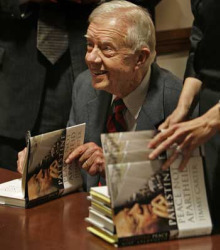 I often receive emails from book stores, amazon.com, Barnes and Noble, and online literary sites telling me how much I’d like the novels of Matt Beynon Rees. I’m delighted to see these emails, which are based on my other purchases and interests, as only I can truly know just how much the novels of Matt Beynon Rees have changed my life. (Try them, I’m sure you’ll agree.)
I often receive emails from book stores, amazon.com, Barnes and Noble, and online literary sites telling me how much I’d like the novels of Matt Beynon Rees. I’m delighted to see these emails, which are based on my other purchases and interests, as only I can truly know just how much the novels of Matt Beynon Rees have changed my life. (Try them, I’m sure you’ll agree.)Of course, I also get the occasional email informing me that if I like Matt Beynon Rees, I might also enjoy another author named in the email. Well, they’re half-way there, because of course I DO like Matt Beynon Rees. No ifs. So I always have to look to see if they’re right about the second part.
The links are sometimes obvious – “if you like Matt Beynon Rees, try [insert crime novelist’s name here:]” – and occasionally baffling though thought-provoking. I had one a few weeks back suggesting fans of Matt Beynon Rees’s Palestinian crime series would really dig a nonfiction book about a cyclone that hit Burma in 2008.
The latest of these connections was no doubt the most bizarre. I clicked on an email from an online book blog a few days ago: “If you like Matt Beynon Rees, we think you’ll enjoy Jimmy Carter.”
Wow, I thought, how did they know that I, too, have lusted after women in my heart.
It could be that the connection was the result of the review of the paperback version of my third Palestinian crime novel THE SAMARITAN’S SECRET in The New York Times—it was featured in the same column as a review of the softcover edition of the 39th President’s ultra-controversial 2006 work of nonfiction “Palestine – Peace Not Apartheid.”
Now here’s where I part with the “If you like Matt Beynon Rees, we think you’ll enjoy Jimmy Carter” email. Of you like Matt Beynon Rees, you’ll probably enjoy crime fiction. Or just fiction. Rather than “Palestine – Peace Not Apartheid,” in which the loveable old peanut farmer from Georgia accuses Israel of the worst kind of discrimination against Palestinians in the West Bank.
I don’t have an opinion on Jimmy’s book. I never read it. It has “Palestine” in the title and, as Graham Greene wrote, once one has lived in a place for a while one ceases to read about it.
Also it has “Apartheid” in the title. I have an opinion about what Israel does in the West Bank. I’m not going to get into it here, but in a (pea)nutshell, I think it’s a mistake to compare Israeli policy to apartheid, because then the debate shifts to the similarities and differences between South Africa’s old regime and Israel’s occupation – instead of talking simply about what Israel does and what’s wrong with it.
As soon as Smiling Jim put “apartheid” in his title, his book’s content was largely ignored. Pro-Israel mouthpieces could condemn him as an anti-Semite simply for comparing Israel to the unlamented and certifiably pariah regime in Pretoria. Game over. Jimmy even issued an apology a couple of years ago to all Jews on Yom Kippur. As though saying something critical of Israel is somehow a criticism of all Jews. As though there weren’t any Jews who agreed with him about Israel’s policy toward the Palestinians. Game over with a slamdown.
For me, as for many others, Carter has been a mildly useful voice for decency in the world. Though he also represents something a little pitiful, as one might witness in the song “Jimmy Carter” by my favorite band, Detroit whacksters Electric Six:
“Like Jimmy Carter,
Like electric underwear,
Like any idea that never had a chance of going anywhere….”
However, the decisive element in the question “If you like Matt Beynon Rees, we think you’ll enjoy Jimmy Carter” is a matter of personal animus. In fact, it’s a family insult suffered by the Rees’s of 32 Neath Road, Maesteg, Mid-Glamorgan, Wales, at the hands of James Earl Carter Jr., 1600 Pennsylvania Avenue, Washington, D.C.
My grandfather Tom Rees read in the Western Mail that then-President Carter was suffering from hemorrhoids. Tom had faced the same ailment some years before and had found nothing eased the feeling of defecating broken glass, until he switched to Allinson’s wholewheat bread. He wrote a letter to the White House in his careful cursive script, letting the leader of the Free World know what he needed to do to poop painlessly.
He didn’t expect any public recognition. But he assumed he’d get a polite note.
Perhaps Carter’s people knew that my grandfather was a former Communist Party member and figured the brown bread was a plot of some sort to keep the Commander-in-Chief on the can and away from the nuclear button, while the Reds swarmed Capitol Hill. In any case, the President never wrote back. Not even a “President Carter has read your inquiry with interest, but regrets that he will not be able to make it part of United States planning and policy at this time, though he is sympathetic to your cause.”
My grandfather continued to consume wholewheat bread, even at a time (the 1970s) when those around him considered it to be a strange fad akin to today’s no-nightshades tomato-free diets.
That’s why I don’t like Carter. Not because of apartheid. Because of hemorrhoids.
I wonder if Jimmy ever got them cured. Maybe he mentions it in his book. Perhaps I ought to read it after all…
Published on May 20, 2010 06:43
•
Tags:
amazon-com, apartheid, barnes-and-noble, crime-fiction, detroit, electric-six, fiction, georgia, glamorgan, graham-greene, hemorrhoids, israel, jews, jimmy-carter, maesteg, matt-beynon-rees, middle-east, new-york-times, palestine, palestine-peace-not-apartheid, palestinian, pennsylvania-avenue, pretoria, south-africa, the-samaritan-s-secret, wales, washington, west-bank, white-house, yom-kippur
My burst Jerusalem bubble
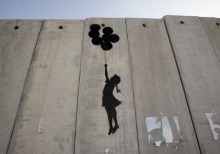 My taxi pulled up at the traffic lights on the way into Jerusalem late Sunday night. A half dozen Breslav hassids were bouncing up and down in front of the traffic, waving signs and grinning with the exultation of wedding party dancers. They were singing, “Death to the Arabs.”
My taxi pulled up at the traffic lights on the way into Jerusalem late Sunday night. A half dozen Breslav hassids were bouncing up and down in front of the traffic, waving signs and grinning with the exultation of wedding party dancers. They were singing, “Death to the Arabs.”Welcome home, I thought. Something dark descended on me. I’d been away for a week attending a literature festival in Dubai. I’d become close – quickly, as can often happen at a conference which keeps you within the confines of a hotel for many days – with a number of exiled Palestinian writers who initially wanted to chat with me about my Palestinian crime novels. As the car beside my taxi honked its horn in time to the murderous chant, I thought of those writers, those beautiful, intelligent souls, and soon enough I found a way out of the darkness.
I’ve made a bubble for myself in Jerusalem. I’m neither Israeli nor Palestinian. I admit that I don’t really participate in either culture. I’ve enjoyed that detachment, because it leaves me to focus on my writing, free of distractions such as caring what the hell happens around me.
In this case, the bubble burst. I had to decide what I would let in through those fractured defenses. Would it be negativity, anger at the jumping scum at the traffic lights whose idea of a response to the slaying of an Israeli family in a settlement near Nablus two nights before was to call for more blood? No, I knew I could fill the space with the books of the Palestinian writers I had met while I was in Dubai.
For the rest of this post read my blog The Man of Twists and Turns.
The sensitive creativity of Susan Abulhawa, whose “Mornings in Jenin” is as powerful a rendering of the disasters of recent Palestinian history as has ever been written, with a universal, human quality of great rarity. The poetry of Nathalie Handal, politically committed and yet mystical. Or Raba’i al-Madhoun, who wrote “The Lady from Tel Aviv,” engaging with Israel and what it has meant in his life, rather than wishing for death to its people.
Thanks to them, I’ve never felt more strongly that literature is the power in my life. Because its subtlety overwhelms the ugly, one-way thinking of politics.
Graham Greene wrote that “when you’ve lived in a place for a while, you cease to read about it” (“The Quiet American”.) That had happened to me, too, here in Jerusalem. It’s been a while since I read much Palestinian or Israeli literature. I think that was a mistake. It meant that my perception of the people who lived around me was too much colored by the stupid politics, by the bouncing fools who want the other guys to die so they can do as they wish.
That won’t happen again.
Published on March 17, 2011 04:59
•
Tags:
arabs, graham-greene, israel, israelis, jerusalem-dubai, jews, literature-festival, nathalie-handal, palestine, palestinians, raba-i-al-madhoun, susan-abulhawa



